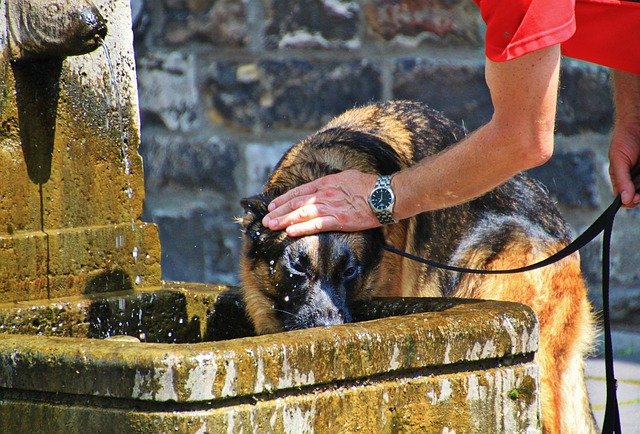
This Summer, Keep Your Dog Safe From Heat and Free From Fear of Fireworks
As July 4th and summer is approaching, it’s a good time to get educated on the latest recommendations to keep your dog safe from overheating, and free from anxiety caused by fireworks.
Fireworks Are No Fun For Most Dogs
A recent study showed that 3 out 4 dogs are adversely affected by fireworks! For this reason, you should think twice about leaving your dog home alone during fireworks events. Signs of anxiety include pacing, trembling, panting, climbing on people, hiding, and worse, bolting from the house and yard. Be sure that your dog has a collar with your phone number and make sure it is microchipped.
Three ways to treat your dog’s fear of fireworks
1. Counter conditioning works by providing desirable stimuli after the occurrence of loud noises. If your dog’s anxiety is not extreme, counter conditioning can create a positive association with fireworks. Do this by giving your dog their most tasty food item (can food, peanut butter, cheese), by offering them their favorite toy or food puzzle object, or by practicing his/her tricks with you. In essence they will focus on the reward and less on the fireworks.
2. Relaxation training works by providing your dog with a desirable coping environment. Allow your dog to seek and retreat to a safe place until the frightening episode subsides. This may mean a crate, closet, or your bed. Provide blankets and pillows to provide comfort and muffle the loud sounds. Cuddle, pet, and talk to your dog in his safe spot. You can also add an Adaptil diffuser, which releases calming pheromones to the safe place. Many dogs also respond well to “pressure vests” as a way to soothe anxiety. Most importantly, be there for your dog.
3. Anxiolytic medication are drugs that calm anxiety. Most of us prefer not to “drug” our pets but it’s easier to prevent a fearful response than it is to reverse one. A short term sedative given BEFORE the fireworks start is the goal here. Commonly veterinarians will prescribe alprazolam (i.e. Xanax) or trazodone. Prior to the fireworks season even starting, it’s good to test the prescribed sedative to figure out the best dose and best timing of administration. Call us, we can help you with the details.
What to Know About Heat Stroke and Dogs
Overheating, aka hyperthermia or heatstroke, can happen quickly, and with lethal consequences!!! When it’s hot outside, keep your dog in the shade or a well-ventilated home. Always provide them with plenty of fresh drinking water.
Don’t Leave Your Dog in the Car
People hear this all the time, but it bears repeating: You should never leave your pet in a car. Leaving your pet in a car even on a relatively cool day (70F) can result in overheating – within one hour the inside temperature of your car will increase by 40 degrees Fahrenheit!
Avoid Outdoor Play When it’s Hot
Unsurprisingly, taking your dog on an extra long walk, or for excessive play sessions can also lead to overheating if the weather is warm. Especially for dogs who are overweight or dogs with “smashed” facial structures, i.e. brachycephalic breeds such as bulldogs, boxers, pugs, etc
What to do if Your Dog is Overheating
If your dog appears distressed, restless, unsteady, is drooling and/or panting excessively it could be due to overheating.
This is what you do: Remove your pet from the “hot” environment to one with shade or inside to a cool space in the house. Point a fan on him/her. If possible, take your dog’s rectal temperature. If its temperature is 105 or higher it has hyperthermia. Apply cold, wet water towels over the back, in the armpits, and in the groin area.
Once the rectal temperature reaches 103.0 stop the cooling down process. Once you have brought your pet’s temperature down to that safe level, call us at EMRVC or the local animal emergency center and immediately bring your pet in for additional treatment. Heat stress and stroke can cause long term impacts and your pet should be seen by professionals.
– Dr. Joseph Zulty
Essex Middle River Veterinary Center provides medical and surgical care for cats and dogs at our animal hospital and veterinary clinic in Essex, Maryland, just outside of Baltimore. Our services include preventive wellness care exams, vaccines, spays/neuters, and a variety of specialized care. Our state-of-the-art veterinary offices are conveniently located near I-695 where we see pets from Towson, Honeygo, White Marsh, and other neighboring Baltimore areas.
